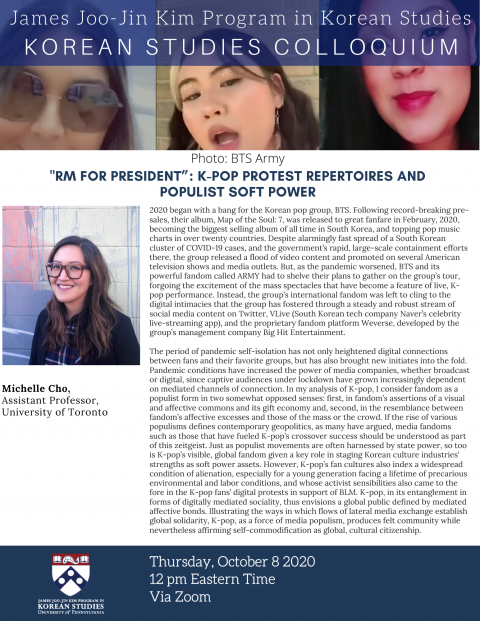
Korean Studies Colloquium
Via Zoom
*Registration required: please register via the following link: https://upenn.zoom.us/meeting/register/tJwtd-2qqj0tH9N2M3NdcpspO6WUZ9sMNlLW
2020 began with a bang for the Korean pop group, BTS. Following record-breaking pre-sales, their album, Map of the Soul: 7, was released to great fanfare in February, 2020, becoming the biggest selling album of all time in South Korea, and topping pop music charts in over twenty countries. Despite alarmingly fast spread of a South Korean cluster of COVID-19 cases, and the government’s rapid, large-scale containment efforts there, the group released a flood of video content and promoted on several American television shows and media outlets. But, as the pandemic worsened, BTS and its powerful fandom called ARMY had to shelve their plans to gather on the group’s tour, forgoing the excitement of the mass spectacles that have become a feature of live, K-pop performance. Instead, the group’s international fandom was left to cling to the digital intimacies that the group has fostered through a steady and robust stream of social media content on Twitter, VLive (South Korean tech company Naver’s celebrity live-streaming app), and the proprietary fandom platform Weverse, developed by the group’s management company Big Hit Entertainment.
The period of pandemic self-isolation has not only heightened digital connections between fans and their favorite groups, but has also brought new initiates into the fold. Pandemic conditions have increased the power of media companies, whether broadcast or digital, since captive audiences under lockdown have grown increasingly dependent on mediated channels of connection. In my analysis of K-pop, I consider fandom as a populist form in two somewhat opposed senses: first, in fandom’s assertions of a visual and affective commons and its gift economy and, second, in the resemblance between fandom’s affective excesses and those of the mass or the crowd. If the rise of various populisms defines contemporary geopolitics, as many have argued, media fandoms such as those that have fueled K-pop’s crossover success should be understood as part of this zeitgeist. Just as populist movements are often harnessed by state power, so too is K-pop’s visible, global fandom given a key role in staging Korean culture industries' strengths as soft power assets. However, K-pop’s fan cultures also index a widespread condition of alienation, especially for a young generation facing a lifetime of precarious environmental and labor conditions, and whose activist sensibilities also came to the fore in the K-pop fans’ digital protests in support of BLM. K-pop, in its entanglement in forms of digitally mediated sociality, thus envisions a global public defined by mediated affective bonds. Illustrating the ways in which flows of lateral media exchange establish global solidarity, K-pop, as a force of media populism, produces felt community while nevertheless affirming self-commodification as global, cultural citizenship.
 James Joo-Jin Kim Center for Korean Studies
James Joo-Jin Kim Center for Korean Studies